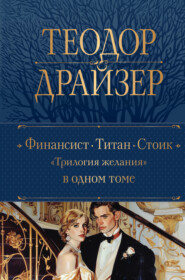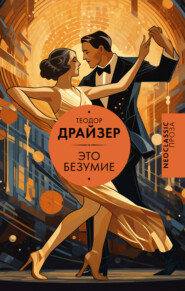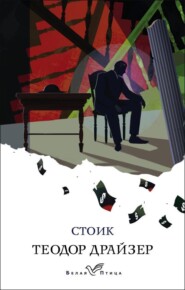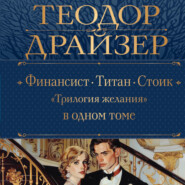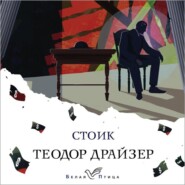По всем вопросам обращайтесь на: info@litportal.ru
(©) 2003-2024.
✖
The Financier / Финансист
Настройки чтения
Размер шрифта
Высота строк
Поля
“Mama does love to talk so. Come on, mama. Let’s look at the dining-room.” It was Norah talking.
“Well, may ye always be happy in it. I wish ye that. I’ve always been happy in mine. May ye always be happy.” And she waddled good-naturedly along.
The Cowperwood family dined hastily alone between seven and eight. At nine the evening guests began to arrive, and now the throng was of a different complexion—girls in mauve and cream-white and salmon-pink and silver-gray, laying aside lace shawls and loose dolmans, and the men in smooth black helping them. Outside in the cold, the carriage doors were slamming, and new guests were arriving constantly. Mrs. Cowperwood stood with her husband and Anna in the main entrance to the reception room, while Joseph and Edward Cowperwood and Mr. and Mrs. Henry W. Cowperwood lingered in the background. Lillian looked charming in a train gown of old rose, with a low, square neck showing a delicate chemisette of fine lace. Her face and figure were still notable, though her face was not as smoothly sweet as it had been years before when Cowperwood had first met her. Anna Cowperwood was not pretty, though she could not be said to be homely. She was small and dark, with a turned-up nose, snapping black eyes, a pert, inquisitive, intelligent, and alas, somewhat critical, air. She had considerable tact in the matter of dressing. Black, in spite of her darkness, with shining beads of sequins on it, helped her complexion greatly, as did a red rose in her hair. She had smooth, white well-rounded arms and shoulders. Bright eyes, a pert manner, clever remarks—these assisted to create an illusion of charm, though, as she often said, it was of little use. “Men want the dolly things.”
In the evening inpour of young men and women came Aileen and Norah, the former throwing off a thin net veil of black lace and a dolman of black silk, which her brother Owen took from her. Norah was with Callum, a straight, erect, smiling young Irishman, who looked as though he might carve a notable career for himself. She wore a short, girlish dress that came to a little below her shoe-tops, a pale-figured lavender and white silk, with a fluffy hoop-skirt of dainty laced-edged ruffles, against which tiny bows of lavender stood out in odd places. There was a great sash of lavender about her waist, and in her hair a rosette of the same color. She looked exceedingly winsome—eager and bright-eyed.
But behind her was her sister in ravishing black satin, scaled as a fish with glistening crimsoned-silver sequins, her round, smooth arms bare to the shoulders, her corsage cut as low in the front and back as her daring, in relation to her sense of the proprieties, permitted. She was naturally of exquisite figure, erect, full-breasted, with somewhat more than gently swelling hips, which, nevertheless, melted into lovely, harmonious lines; and this low-cut corsage, receding back and front into a deep V, above a short, gracefully draped overskirt of black tulle and silver tissue, set her off to perfection. Her full, smooth, roundly modeled neck was enhanced in its cream-pink whiteness by an inch-wide necklet of black jet cut in many faceted black squares. Her complexion, naturally high in tone because of the pink of health, was enhanced by the tiniest speck of black court-plaster laid upon her cheekbone; and her hair, heightened in its reddish-gold by her dress, was fluffed loosely and adroitly about her eyes. The main mass of this treasure was done in two loose braids caught up in a black spangled net at the back of her neck; and her eyebrows had been emphasized by a pencil into something almost as significant as her hair. She was, for the occasion, a little too emphatic, perhaps, and yet more because of her burning vitality than of her costume. Art for her should have meant subduing her physical and spiritual significance. Life for her meant emphasizing them.
“Lillian!” Anna nudged her sister-in-law. She was grieved to think that Aileen was wearing black and looked so much better than either of them.
“I see,” Lillian replied, in a subdued tone.
“So you’re back again.” She was addressing Aileen. “It’s chilly out, isn’t it?”
“I don’t mind. Don’t the rooms look lovely?”
She was gazing at the softly lighted chambers and the throng before her.
Norah began to babble to Anna. “You know, I just thought I never would get this old thing on.” She was speaking of her dress. “Aileen wouldn’t help me—the mean thing!”
Aileen had swept on to Cowperwood and his mother, who was near him. She had removed from her arm the black satin ribbon which held her train and kicked the skirts loose and free. Her eyes gleamed almost pleadingly for all her hauteur, like a spirited collie’s, and her even teeth showed beautifully.
Cowperwood understood her precisely, as he did any fine, spirited animal.
“I can’t tell you how nice you look,” he whispered to her, familiarly, as though there was an old understanding between them. “You’re like fire and song.”
He did not know why he said this. He was not especially poetic. He had not formulated the phrase beforehand. Since his first glimpse of her in the hall, his feelings and ideas had been leaping and plunging like spirited horses. This girl made him set his teeth and narrow his eyes. Involuntarily he squared his jaw, looking more defiant, forceful, efficient, as she drew near.
But Aileen and her sister were almost instantly surrounded by young men seeking to be introduced and to write their names on dance-cards, and for the time being she was lost to view.
Chapter XVIII
The seeds of change—subtle, metaphysical—are rooted deeply. From the first mention of the dance by Mrs. Cowperwood and Anna, Aileen had been conscious of a desire toward a more effective presentation of herself than as yet, for all her father’s money, she had been able to achieve. The company which she was to encounter, as she well knew, was to be so much more impressive, distinguished than anything she had heretofore known socially. Then, too, Cowperwood appeared as something more definite in her mind than he had been before, and to save herself she could not get him out of her consciousness.
“Well, may ye always be happy in it. I wish ye that. I’ve always been happy in mine. May ye always be happy.” And she waddled good-naturedly along.
The Cowperwood family dined hastily alone between seven and eight. At nine the evening guests began to arrive, and now the throng was of a different complexion—girls in mauve and cream-white and salmon-pink and silver-gray, laying aside lace shawls and loose dolmans, and the men in smooth black helping them. Outside in the cold, the carriage doors were slamming, and new guests were arriving constantly. Mrs. Cowperwood stood with her husband and Anna in the main entrance to the reception room, while Joseph and Edward Cowperwood and Mr. and Mrs. Henry W. Cowperwood lingered in the background. Lillian looked charming in a train gown of old rose, with a low, square neck showing a delicate chemisette of fine lace. Her face and figure were still notable, though her face was not as smoothly sweet as it had been years before when Cowperwood had first met her. Anna Cowperwood was not pretty, though she could not be said to be homely. She was small and dark, with a turned-up nose, snapping black eyes, a pert, inquisitive, intelligent, and alas, somewhat critical, air. She had considerable tact in the matter of dressing. Black, in spite of her darkness, with shining beads of sequins on it, helped her complexion greatly, as did a red rose in her hair. She had smooth, white well-rounded arms and shoulders. Bright eyes, a pert manner, clever remarks—these assisted to create an illusion of charm, though, as she often said, it was of little use. “Men want the dolly things.”
In the evening inpour of young men and women came Aileen and Norah, the former throwing off a thin net veil of black lace and a dolman of black silk, which her brother Owen took from her. Norah was with Callum, a straight, erect, smiling young Irishman, who looked as though he might carve a notable career for himself. She wore a short, girlish dress that came to a little below her shoe-tops, a pale-figured lavender and white silk, with a fluffy hoop-skirt of dainty laced-edged ruffles, against which tiny bows of lavender stood out in odd places. There was a great sash of lavender about her waist, and in her hair a rosette of the same color. She looked exceedingly winsome—eager and bright-eyed.
But behind her was her sister in ravishing black satin, scaled as a fish with glistening crimsoned-silver sequins, her round, smooth arms bare to the shoulders, her corsage cut as low in the front and back as her daring, in relation to her sense of the proprieties, permitted. She was naturally of exquisite figure, erect, full-breasted, with somewhat more than gently swelling hips, which, nevertheless, melted into lovely, harmonious lines; and this low-cut corsage, receding back and front into a deep V, above a short, gracefully draped overskirt of black tulle and silver tissue, set her off to perfection. Her full, smooth, roundly modeled neck was enhanced in its cream-pink whiteness by an inch-wide necklet of black jet cut in many faceted black squares. Her complexion, naturally high in tone because of the pink of health, was enhanced by the tiniest speck of black court-plaster laid upon her cheekbone; and her hair, heightened in its reddish-gold by her dress, was fluffed loosely and adroitly about her eyes. The main mass of this treasure was done in two loose braids caught up in a black spangled net at the back of her neck; and her eyebrows had been emphasized by a pencil into something almost as significant as her hair. She was, for the occasion, a little too emphatic, perhaps, and yet more because of her burning vitality than of her costume. Art for her should have meant subduing her physical and spiritual significance. Life for her meant emphasizing them.
“Lillian!” Anna nudged her sister-in-law. She was grieved to think that Aileen was wearing black and looked so much better than either of them.
“I see,” Lillian replied, in a subdued tone.
“So you’re back again.” She was addressing Aileen. “It’s chilly out, isn’t it?”
“I don’t mind. Don’t the rooms look lovely?”
She was gazing at the softly lighted chambers and the throng before her.
Norah began to babble to Anna. “You know, I just thought I never would get this old thing on.” She was speaking of her dress. “Aileen wouldn’t help me—the mean thing!”
Aileen had swept on to Cowperwood and his mother, who was near him. She had removed from her arm the black satin ribbon which held her train and kicked the skirts loose and free. Her eyes gleamed almost pleadingly for all her hauteur, like a spirited collie’s, and her even teeth showed beautifully.
Cowperwood understood her precisely, as he did any fine, spirited animal.
“I can’t tell you how nice you look,” he whispered to her, familiarly, as though there was an old understanding between them. “You’re like fire and song.”
He did not know why he said this. He was not especially poetic. He had not formulated the phrase beforehand. Since his first glimpse of her in the hall, his feelings and ideas had been leaping and plunging like spirited horses. This girl made him set his teeth and narrow his eyes. Involuntarily he squared his jaw, looking more defiant, forceful, efficient, as she drew near.
But Aileen and her sister were almost instantly surrounded by young men seeking to be introduced and to write their names on dance-cards, and for the time being she was lost to view.
Chapter XVIII
The seeds of change—subtle, metaphysical—are rooted deeply. From the first mention of the dance by Mrs. Cowperwood and Anna, Aileen had been conscious of a desire toward a more effective presentation of herself than as yet, for all her father’s money, she had been able to achieve. The company which she was to encounter, as she well knew, was to be so much more impressive, distinguished than anything she had heretofore known socially. Then, too, Cowperwood appeared as something more definite in her mind than he had been before, and to save herself she could not get him out of her consciousness.
Вы ознакомились с фрагментом книги.
Приобретайте полный текст книги у нашего партнера:
Приобретайте полный текст книги у нашего партнера:






